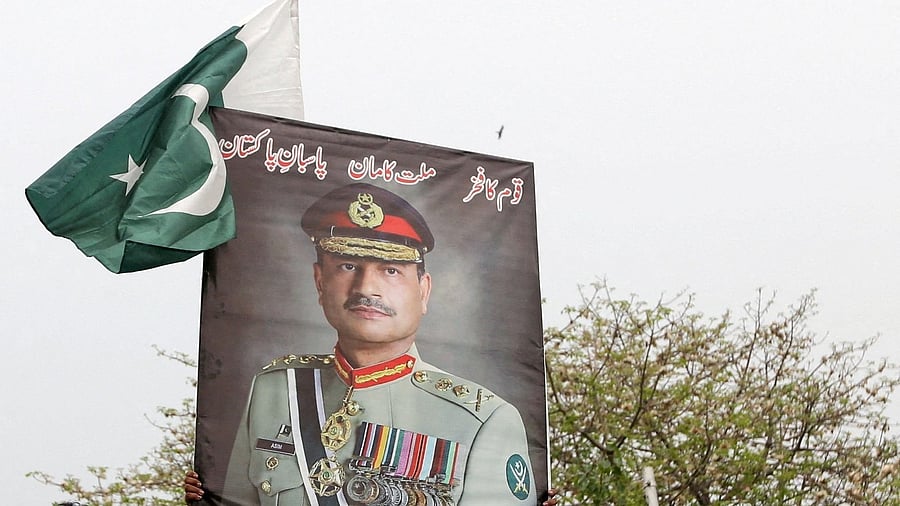
People carry posters showing the pictures of Chief of Army Staff of Pakistan Asim Munir.
Credit: Reuters Photo
New Delhi: India on Monday stated that the comments made by Pakistan Army chief, Field Marshal Asim Munir, in the United States, boasting of his country’s nuclear arsenal, had reinforced the doubts over the security of the weapons of mass destruction in his country, where the military was hand-in-glove with the terrorist organisations.
New Delhi also subtly conveyed its displeasure to Washington, DC, for allowing Munir to make such comments during his visit to the US and deplored that the Pakistan Army chief had resorted to nuclear blackmail against India from the soil of “a friendly third country”. What also riled New Delhi is the US statement that its military partnership with Pakistan was key to nuclear security in South Asia.
Munir, whom New Delhi accused of provoking the April 22 carnage in J&K with an incendiary speech, attended the farewell ceremony of General Michael Erik Kurilla, the outgoing commander of the US Central Command, at the Tampa Convention Centre in Florida on August 8. Kurilla, who had called Pakistan a phenomenal counter-terrorism partner of the US just a few weeks ago, relinquished command to Admiral Brad Cooper of the American Navy.
The Pakistan Army chief also attended a dinner hosted in his honour in Tampa. The cross-border flare-up between India and Pakistan between May 7 and 10 came up for discussion during the dinner, which was attended by several Pakistani Americans settled in Florida.
Munir purportedly said that Pakistan was a nuclear power and, if it ever had to go down, it would take half of the world with it. He also slammed India for suspending its Indus Water Treaty with Pakistan in the wake of the killing of 26 people, mostly tourists, at Baisaran near Pahalgam in J&K on April 22. He said that Pakistan would wait for India to complete building the dams on the Indus and its tributaries and then fire missiles to destroy the dams, according to the reports received by New Delhi.
“Our attention has been drawn to remarks reportedly made by the Pakistani Chief of Army Staff while on a visit to the United States,” Randhir Jaiswal, the spokesperson of the Ministry of External Affairs (MEA) of the Government of India, said in New Delhi, adding: “Nuclear sabre-rattling is Pakistan’s stock-in-trade.”
“The international community can draw its own conclusions on the irresponsibility inherent in such remarks, which also reinforce the well-held doubts about the integrity of nuclear command and control in a state where the military is hand-in-glove with terrorist groups,” the MEA spokesperson said in New Delhi. “It is also regrettable that these remarks were made from the soil of a friendly third country.”
The Pakistan Army chief also met the chairman of the US Joint Chiefs of Staff, General Dan Caine, and discussed “counter-terrorism cooperation efforts in the region and the strong relationship between the two militaries”.
“The US-Pakistan military partnership is necessary for advancing shared security goals, promoting regional stability, and supporting peace and nuclear security in South Asia," Joseph Holstead, a US military spokesperson, said last week.
“India has already made it clear that it will not give in to nuclear blackmail. We will continue to take all steps necessary to safeguard our national security,” Jaiswal said in New Delhi on Monday, reiterating Prime Minister Narendra Modi’s vow just days after the cross-border military flare-up between the two South Asian neighbours.
The Pakistan Army chief’s not-so-subtle nuclear threat against India on US soil came even as President Donald Trump’s tariff tirade of late strained the relations between New Delhi and Washington, DC. Trump, himself, had hosted Munir at the White House on June 19.
India responded to the carnage in J&K by launching 'Operation Sindoor' early on May 7 and carrying out precision strikes targeting terrorist camps in Pakistan as well as in areas under illegal occupation of Pakistan. The Pakistan Army retaliated, targeting civilians and military facilities in India. The cross-border offensive and counter-offensive came to a halt on May 10 when both sides reached an understanding.
Trump, over the past three months, repeatedly claimed credit for brokering the ceasefire between India and Pakistan. While New Delhi rejected his claim, Islamabad not only endorsed it, but also nominated the US president for the Nobel Peace Prize.
The US president recently imposed a 50 per cent tariff on imports from India. He accused New Delhi of imposing high tariffs and erecting non-tariff barriers for the US companies doing business in India.
He also criticised India for continuing to buy weapons and energy from Russia, defying the sanctions imposed by the US and the European Union on the former Soviet Union nation for its special military operations in Ukraine. The US president further called the economies of India and Russia "dead". He even announced a trade deal between Pakistan and the US.
